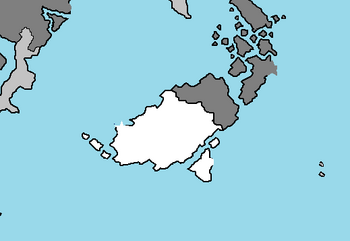Behinia
Islamic Federation of Behinia بهينيا | |
|---|---|
|
Flag | |
 | |
| Capital | Sannar |
| Largest city | Kosti |
| Official languages | Behin, Emmirian |
| Religion | Islam |
| Demonym(s) | Behinian |
| Government | Federal parliamentary republic |
| Mohamed al-Albisi | |
| Mahmoud Karin | |
| Establishment | |
• Independence | January 3rd, 1908 |
• Federation | September 14th, 1922 |
| Population | |
• 2022 estimate | 5,287,100 |
| Gini | 22 low |
| HDI | 0.674 medium |
| Currency | bet |
The Islamic Federation of Behinia, commonly referred to as Behinia, is a archipelagic nation in eastern Adula, bordered to the north on the main island by Grodos Antis, and having maritime borders with Emmiria, San Martina, and Verdusa. The country contests ownership of the Masse Islands, which are governed by Albarine. Its coastline is defined by the Emmiria Sea and the Cantalle Ocean. Behinia has a population of 5.3 million people, with the capital being Sannar and the largest city being Kosti. Other important cities include Alkawa and Buqayq. The country has a history spanning back thousands of years when it was a caliphate within the Emmirian Empire. It changed hands of control between the Skithan, Quetanan, and Emmirians throughout history, but ultimately gained independence from Emmiria in 1908.
Behinia is a federal parliamentary republic. The president, currently Mohamed al-Albisi is the head of state, the Prime Minister is the head of government, and the constitution provides for two deliberative bodies, the Council of Representatives and the Council of Union. The judiciary is free and independent of the executive and the legislature. Behinia is considered an emerging middle power with a strategic location and important resources like oil and natural gas. It is a member of the CCA, the TTPA, and the CTO. Since its independence, Behinia's political history has been characterized by periods of significant economic and military growth, as well as periods of political and economic instability.
